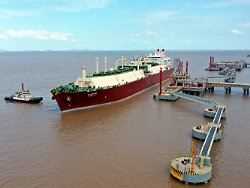Friday October 15, 2021
Is the EU losing out?
China wants to grab US liquefied petroleum gas
Gas is becoming more and more expensive. This is also due to China’s enormous demand for liquefied gas. Corporations from the People’s Republic now want to shop in the USA. This can become a problem for the EU.
In light of the energy crisis, large Chinese companies are in advanced talks with US exporters about a multi-billion dollar contract for the supply of liquefied natural gas (LNG). According to Reuters news agency, at least five corporations are negotiating it, including the state-owned Sinopec and the China National Offshore Oil Company (CNOOC). The deal could be worth tens of billions of dollars.
The liquefied gas is delivered by large tankers. It is then converted back into gas and then fed into the gas network.
“We expect that contracts will be signed before the end of the year,” said one of the participants from Beijing. “This is mainly being driven by the global energy crisis and the prices we are seeing now. US supplies are attractive now.” On the US side, negotiations are mainly with Cheniere Energy and Venture Global. Sinopec alone could envisage deliveries over four million tons annually, said one of the insiders.
The second largest economy and at the same time the largest manufacturing industry on the planet is currently buying the LNG market empty and paying record prices to secure supplies in the approaching winter. The reason: In the People’s Republic, coal – the most important source of electricity there – is scarce in the storage tanks of power plants. The country with the world’s greatest hunger for coal has a big problem: The trade dispute with Australia, the world’s second largest coal exporter, has resulted in deliveries to China being severely restricted.
Prices are skyrocketing
If there is an imminent deal between US and Chinese companies, this could become a problem for Europe. The gas storage facilities here are not as full as they were last year. Gas prices have skyrocketed in the past few months. They usually continue to rise in autumn and winter – for example because of the heating season and the increased power consumption for lighting.
The wholesale prices at the important Dutch gas trading point TTF have therefore risen by more than 400 percent since January. The wholesale prices for electricity have doubled. If US tankers with liquefied natural gas (LNG) head for Asia instead of Europe, this is likely to increase prices.
According to President Vladimir Putin, Russia wants to transport more gas to Europe. The state-controlled Russian company Gazprom is already Europe’s most important supplier. It is still unclear when the Nord Stream 2 gas pipeline, which can bring more gas from Russia to Europe, will go into operation. However, Russia’s export options may be limited, explains Bank of America. The company’s own storage facilities in Russia are still being filled, and production is already as high as it was last almost ten years ago.
However, MEPs accuse Russia of deliberately increasing the price of gas in order to quickly obtain an operating license for the Nord Stream 2 Baltic Sea pipeline. Their argumentation: Gazprom is fulfilling existing contracts, but refusing to book additional gas deliveries through existing pipelines. Despite high prices, Gazprom does not meet the higher demand and has even cut its own production. Gazprom rejects that.
EU is looking for a solution
Rising gas prices and increasing power outages have meanwhile raised the question of security of supply in the People’s Republic. The talks with the US side that had already started at the beginning of the year have therefore picked up speed in the past few weeks, it said.
At the height of the Sino-American trade war in 2019 under the then US President Donald Trump, gas trade between the two largest economic powers in the world came to a brief standstill.
China has already overtaken Japan as the world’s largest LNG buyer this year and could consolidate this position. “State companies are all under pressure to maintain security of supply,” said a Beijing-based trader. The recent price hike has increased the need for long-term supply agreements. Natural gas prices in Asia have more than quintupled this year. This increases concerns about a power shortage in winter.
The EU heads of state and government want to deal with the high gas prices and possible delivery problems at their summit at the end of October. EU Energy Commissioner Kadri Simson has announced that she will soon present a plan to reform the European gas market. Spain and Italy have proposed joint EU gas purchases. This would give the countries a stronger position in purchasing.
